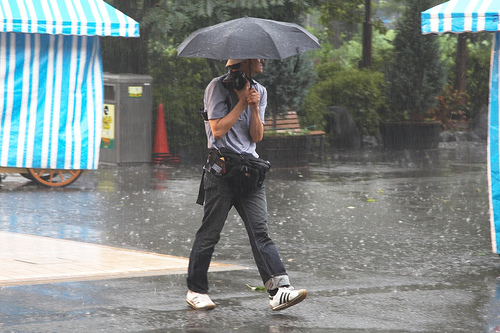WIT Life #42: Guerrilla Rain and Shotgun Marriages
WITLife is a periodic series written by professional Interpreter/Translator/Writer Stacy Smith (Kumamoto-ken, 2000-03). Recently she’s been watching Fujisankei’s newscast in Japanese and sharing some of the interesting tidbits and trends together with her own observations.
Japan has just officially entered the rainy season, a period many of us might remember as a time when it’s impossible to get your laundry done as there are few dry days to hang it outside. Last year the buzzword at this time was ゲリラ豪雨 (gerira gouu) or “guerrilla rain,” referring to the sudden fierce downpours similar to flash floods that on occasion took people’s lives and are thought to be an effect of global warming. Courtesy of innovation from the Japan Meteorological Agency, perhaps this year’s rainy season will be spent a bit easier. It has scattered GPS locators thoughout the country, enabling people to get notification on their cell phones when these squalls are about to strike. Thanks to technology, a little heads up will allow recipients to take cover before conditions get too bad.
impossible to get your laundry done as there are few dry days to hang it outside. Last year the buzzword at this time was ゲリラ豪雨 (gerira gouu) or “guerrilla rain,” referring to the sudden fierce downpours similar to flash floods that on occasion took people’s lives and are thought to be an effect of global warming. Courtesy of innovation from the Japan Meteorological Agency, perhaps this year’s rainy season will be spent a bit easier. It has scattered GPS locators thoughout the country, enabling people to get notification on their cell phones when these squalls are about to strike. Thanks to technology, a little heads up will allow recipients to take cover before conditions get too bad.
Perhaps because last year was so devastating, this year’s sales of rainy weather goods are already triple the previous amount. Many of these products have been designed to resist the guerrilla rain and wind, such as the Senz umbrella which retails for 1740 yen and is billed as being “smart, strong and stylish.” Its original assymetrical shape is short and rounded in the front and long and pointed in the back, and in tests it did not turn inside out like typical umbrellas, even during 20m/s winds (there’s a video of it on You Tube maintaining its form in a hurricane simulation machine!). This umbrella is from Holland but is all the rage in Japan, with it being marketed as the perfect gift for upcoming Father’s Day.
Speaking of fathers, another piece on the news this morning highlighted how there is currently a trend of increasing shotgun marriages. In Japanese できちゃった結婚 (dekichatta kekkon) used to be the term of choice for this phenomenon, but now the new phrase おめでた婚 (omedeta kon) is being used, perhaps to give it a more positive connotation (The previous term conveys a sense of ending up that way, whereas the new one involves congratulations). On-the-street interviews of people from various generations were carried out, and as expected the answers differed greatly by age. Younger participants were likely to express their approval of and even enthusiasm for shotgun marriages, whereas older ones brought up issues of disapproval and shame and doing things in the proper order. Despite the understanding on the side of the youth, in a survey over 80% said they would not want an omedeta kon for themselves. Also, it was interesting to note that the majority of the respondents used the phrase dekichatta kekkon, indicating that the new term is yet to fully catch on.
A wedding store in Tokyo that was visited by the news crew stated a 30% increase in omedeta kon customers this year. They described their “W Happy Wedding Fair” (W meaning Double) geared toward this specific clientele. The package involves various touches to make the ceremony easier for the pregnant bride. These changes from a typical service include using less pungent smelling flowers like hydrangea (and providing a room to rest incase these get to the bride as well), shortening the time of the ceremony to lessen its toll and providing a wedding dress that has elastic around the waistline.
I don’t know what this increase in shotgun marriages can be attributed to (guerilla rain keeping people inside?), but it is an interesting trend to note. I personally feel like I know many more Japanese people who got married this way than people here in the States, and when I first got to Japan I was surprised they were being so open about it. One of my closest friends actually had her daughter (who had already been born) join in the ceremony! There was a drama many years back caled Dekichatta Kekkon, and lately couples coming together this way seems to be all the rage among celebrities, perhaps contributing to the boom. Discussion of shotgun marriage reminds me of the Japanese attitude toward abortion, so maybe this is another area where they are more laissez-faire than their seemingly strict society would indicate.


Comments are closed.